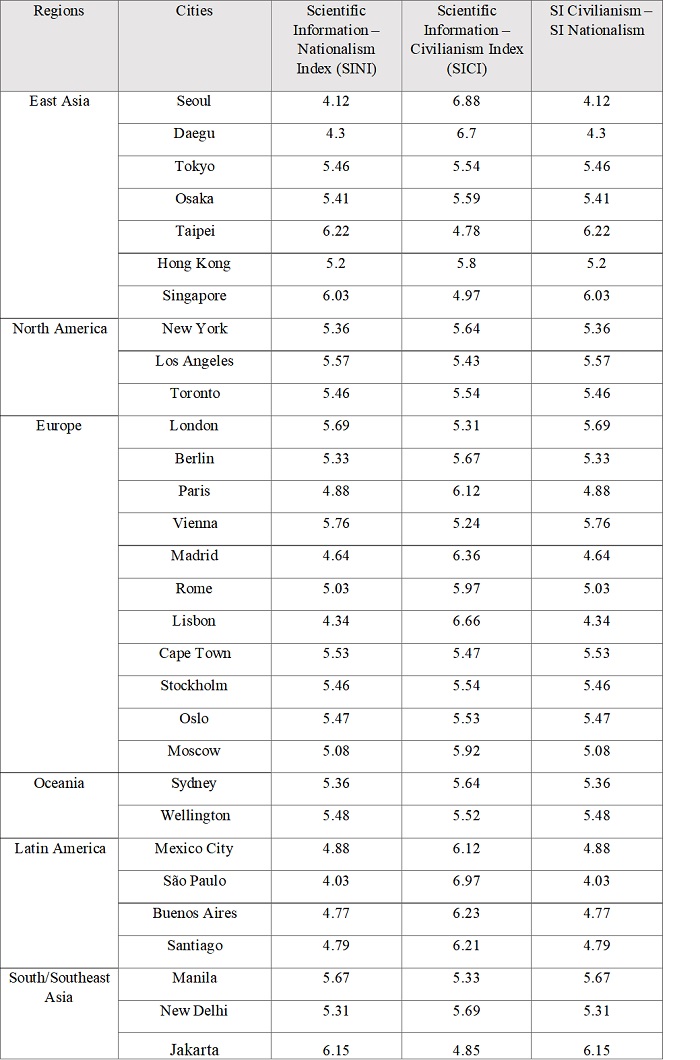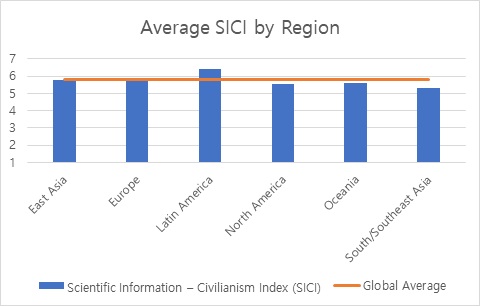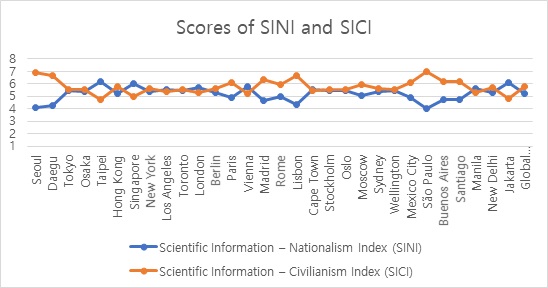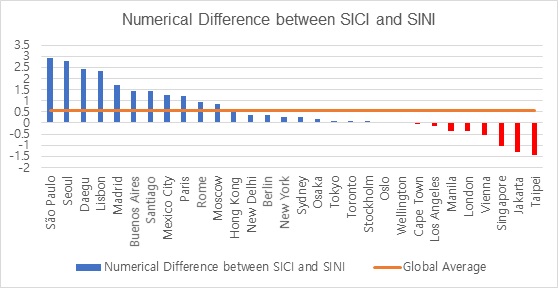Impact of Providing Scientific Information during the
COVID-19
1.
Background
COVID-19
data analysis 5 series will focus on how emergency measurements during the
COVID-19 influence the nationalism around the world. To illustrate, we will analyze
the survey results of opinions of global citizens whether they perceive a
certain policy will lead a country to nationalism or citizens’ cooperation.
International cooperation is occasionally disturbed by countries with strong
and offensive nationalism, and sometimes, even a central government cannot
control the national outrage triggered by nationalistic sentiment. Even worse,
irrational nationalism would bring about racism and xenophobia, which severely
undermines the free and open market around the globe. On the contrary,
cooperation among citizens and governments would enhance the effectiveness of
abating the crisis and it will help fast recovery from an emergency to everyday
life.
With
the COVID-19 outbreak, many countries have been suffering from fake and
exaggerated information, leading citizens into panic and fear. It is only
scientific and accurate information that can alleviate people’s immoderate tension
and surprise. Then what would global citizens think of the impact of providing
scientific information by the government?
2.
Research
Topic
In the middle of the COVID-19 pandemic, it
is of importance for a government to make a rapid measurement to fight against
the virus. However, it is also of equal significance to think of ramifications
of the emergency policies and people’s support. This section will analyze how
global citizens see scientific information provided by governments, especially
how people assess the policy’s influence on a country’s nationalism and
civilianism during the COVID-19 crisis.
3.
Questionnaire
Used
Survey Question II-7: “While fighting
against a global pandemic like COVID-19, a country may begin to follow either a
state-centric and chauvinist path, or a democratic path based on citizen
participation. In terms of providing scientific information by governments, what
direction do you expect the following policies/trends to take?”
The answers consist of a 10-point scale,
with higher scores indicating an individual believes the policy will lead
citizens to democratic/participatory citizenship and lower scores demonstrating
a person acknowledges the measure will result in citizens’
state-centric/chauvinistic.
4.
Major
Outcomes
Table 1: Scientific Information –
Nationalism Index (SINI) and Scientific Information –
Civilianism Index (SICI) by Citizens of 30 Global Cities

Respondents are asked to choose one score
to represent their ideas on the question, and the average scores of each city
indicate the Scientific Information – Civilianism Index (SICI). It demonstrates
that how much do citizens of a city consider providing scientific information
by the government will cause citizens’ cooperation and participation amid the
crisis, and the higher the score is, the more individuals think the measurement
will have a positive effect on society. Meanwhile, the reverse scaling was used
in the Scientific Information – Nationalism Index (SINI), which means that 11
minus SICI is the SINI. Similarly, the higher the SINI score is, the more a
citizen speak ill of the policy under the democratic and liberal principles.
Finally, the numerical differences between the two scores were calculated in
order to show which side a city is putting more significance. To illustrate,
the higher a numerical difference is, the more citizens of the city underscore
the above-mentioned policy in the course of the pandemic crisis.
Table 2: Average Scientific
Information – Civilianism Index (SICI) by Region
|
Regions
|
Average Scientific Information - Civilianism Index
(1 – 10)
|
|
East Asia
|
5.76
|
|
Europe
|
5.80
|
|
Latin America
|
6.39
|
|
North America
|
5.54
|
|
Oceania
|
5.58
|
|
South/Southeast Asia
|
5.29
|
The scores in the
table are the average Scientific Information –
Civilianism Index (SICI) of
the global citizens by region. To be specific, the lowest score of 5.29 was
rated by South/Southeast Asian citizens on average. It exhibits that people in
this region least likely to deem that the scientific information will have a
positive effect on civilianism compared to other regions in the world. On the
contrary, the highest score of 6.39 was rated by Latin American citizens, which
illustrates that people here are most likely to highlight a certain policy and
believe the measurement would lead to citizens’ cooperation in society.
Figure 1: Bar Graph of Average Scientific
Information – Civilianism Index (SICI) by Region

Figure 1 is the
visualized graph of Table 2, and the orange line is the world average Scientific
Information – Civilianism Index (SICI). That Latin American citizens think highly of the
citizens’ privacy is evidenced by the figure, and the importance is emphasized
followed by Europe, East Asia, Oceania, North America, and South/Southeast
Asia. These are generalized scored by region, and therefore, for more detailed
analysis, let’s see each city’s score of SICI and SINI.
Figure 2: Line Graph of Scientific Information
– Nationalism Index (SINI) and Scientific Information – Civilianism Index (SICI)

This figure is a visualized version of
Table 1, and the most
outstanding finding of Figure 2 is that South Korea, Southern Europe, and Latin
America, represented by Seoul and Daegu, Madrid, Rome, Lisbon, Mexico City, Sao
Paulo, Buenos Aires, and Santiago show a huge gap between the impact of
scientific information provided by governments. It means that citizens of these
regions generally regard that scientific information will lead society into the
cooperative status and urge people to actively participate in mitigating the
virus spread. Meanwhile, other cities are holding divergent opinions regarding the
ramification of scientific information.
Figure 3: Bar Graph of Numerical Difference
between Scientific Information – Civilianism Index (SICI) and Scientific
Information – Nationalism Index (SINI)

The differences
between SICIs and SINIs are drawn as a bar graph, shown in Figure 3. The orange
bar indicates the global average difference score (0.55). Cities with negative
numerical differences are marked with red bars, indicating citizens of that
city believe that the scientific information will lead a country to nationalism
and prevent cooperation among people and countries; yet, cities with blue bars
express that the true and reliable information is effective in a way of
stimulating the cooperation and participation on preventing the further spread
of the coronavirus. To be more specific, all Latin American people reckon that
knowing scientific information regarding COVID-19 will have a positive impact
on society, whereas citizens in Taipei, Jakarta, Singapore, Vienna, London,
Manila, Los Angeles, Cape Town suppose that the scientific information may not
positively affect the society and lead people to nationalism. Besides, except
for Latin America, there are no constant characteristics by region. For
instance, New York citizens think that scientific information would lead a
country to civilianism, while people in Los Angeles concluded that accurate
information may lead society into nationalism.
5.
Summaries
and Further Tasks
a.
Data
analysis shows contradicting views on the impact of scientific information by
global citizens.
b.
Citizens
in Taipei, Jakarta, Singapore, Vienna, London, Manila, Los Angeles, Cape Town
suppose that the scientific information may not positively affect the society
and lead people to state-centric nationalism, which obstructs further
cooperation in international society. Other than these cities, along with Latin
American cities conclude that the scientific information will lead citizens to
be more participative and cooperative in abating the COVID-19 pandemic.
c.
Latin
American average SICI is higher than the global average, indicating people here
are confident in scientific information impact.
d.
The
study is limited to descriptive research, and therefore, a more detailed
explanative investigation is required to further understand the global citizens’
consciousness presented above. For instance, why citizens in Latin America are affirmative
about the impact of scientific information? Why people in some cities think
that scientific information will lead citizens to state-centric nationalism
rather than cooperative civilianism?
|